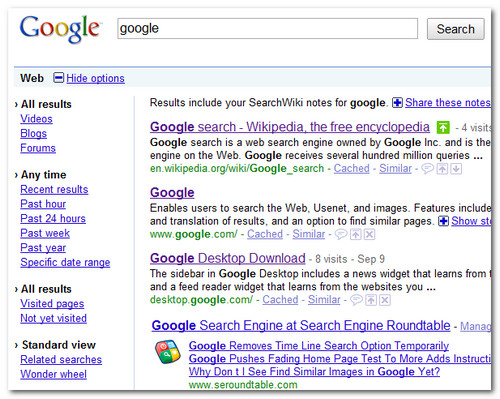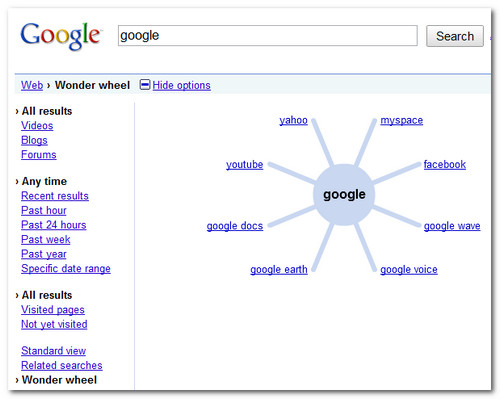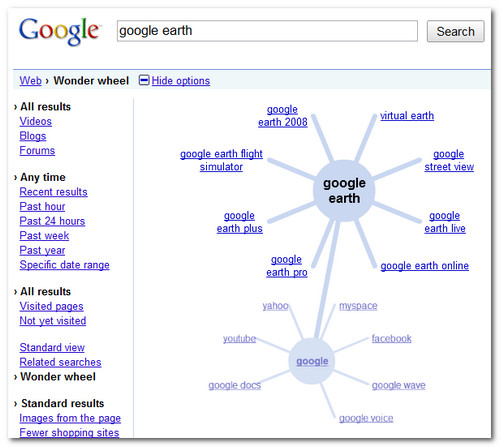Borrowing From PPC
Search marketers know that if the title of the ad matches the searchers keyword query, they stand a good chance of getting the click.
This mirroring strategy works for obvious reasons. The visitor already has a psychological attachment to the phrase - after all, they typed it in!
Making Sure You Get The Click
A lot of SEO strategy talks about how to achieve rankings.
Whilst important, the SEO pro knows ranking is only half the battle won. While it's true to say most searchers will click on the top results in preference to results lower down the page, they will also scan across the various titles displayed. All links on the results page compete for the click, and a compelling title may win out over a higher ranking position.
If the user doesn't find what they want when they scan, they will likely rephrase their search and try again. So the way you phrase your title tag is not only important in terms of helping attain a ranking position, it is also important that it stands out.
But how do you know which phrases will work?
What You Can Learn From Adwords
Actually, the answer is right in front of us.
Google rewards top performing Adwords advertisers with the top positions i.e. the advertisers who are achieving the highest click thru rates. The copy and titles you see in the top PPC ads are proven.
If the advertiser has been in that position for some time, it is highly likely s/he is making a positive return on their spend. Their approach is, therefore, working.
That's a lot of valuable information.
Look at the copy the advertisers are using. What words are they using in the title? Try emulating their approach. Emulating their description is a little more tricky as Google uses snippets. However, if the phrase the user is searching for also appears in your meta description tag, Google will tend to display the tag snippet instead.
Of course, SEO's have to balance ranking considerations, too, but if you can get these factors aligned, you're in a great position. Given that most people - estimated to be around 70-80% - will click on a natural search result, as opposed to an advertisment, if you can occupy the top few spots using a similar phrasing as the PPC advertiser, you are more likely to get the click.
Don't stop there.
Check out the landing pages used by the top advertisers. If they are occupying top positions over a long period of time, they are either carelessly blowing through a lot of cash, or, more likely, their PPC campaign is making money.
Whilst it's not advisable to copy exactly what they do - and it's probably against the law - you can use their approach as a guide. How are they structuring their landing pages? Where are they placing their offer? What language are they using? What titles are they using? How is the copy structured?
Use a similar approach in your SEO campaign.
One thing to be careful of is to understand that SEO and PPC often have a different focus. PPC tends to be driven by ROI and other profit per visitor type metrics. Once a PPC advertiser pays for the click, they try to move the visitor to desired action quickly.
SEO, on the other hand, can afford to be less specific as there is little jeopardy in only appealing to a tiny fraction of visitors who click. SEO can afford to go wide and broad. Engagement and brand metrics come into play a bit more in SEO.
By The Way.....
Because SEO can afford to go broad, and has the added task of ranking for keywords based on the content of your page, Google's Wonder Wheel is a great tool for finding related phrases which you can integrate into your copy.
If you haven't heard of the Wonder Wheel, here is how to find it:
1. Conduct a search. Click on "Show Options..."

2. Click on "Wonder Wheel" (shown on the list at the right hand side)

3. Click on a few of the spokes....

4. Integrate any relevant, related keyword terms in your copy....

I use this tool a lot as it's great for picking up on long tail searches that still relate to your chosen keyword term. If any of these terms prove worthwhile, you can then develop separate pages to target them specifically.




Comments
Nice post about using apparently successful PPC tactics as path indicators for your own efforts. There is currently only one snag when it comes to Adwords:
If you are not in a vertical that contains some really grown-up ecommerce operators and marketers, I reckon the data may not be too useful. For every well crafted, ROI positive PPC campaign there must be at least 10 amatuerish, DIY "sign up and stick up" ad runs. And if there is no "real" players in that particular vertical, the PPC "winners" are just the ones with more money that sense.
Adwords has potential to fleece unwary businesses right up until the point that they give up DIY PPC as a bad job. It's so easy to sign up, run the tools badly and watch your money disappear.
When looking at competitors PPC campaigns, just remember that you may already be the most savvy in the marketplace by a long chalk.
@On Stage Lighting
Can you please show me some of these less mature markets :) I want to go dominate them!
>>If you are not in a vertical that contains some really grown-up ecommerce operators and marketers, I reckon the data may not be too useful
Yes, true.
Here's a trend I've seen: in addition to pushing their own products within search results, they've gotten better at stripping organic results of commercial content, in favor of informational content and other Google products even if the phrase is one of consumer intent. Now, I almost have to click on ads if I want to use Google as a consumer of goods / services.
For many search results Google also has a filter that is accessible through the same sequence as the wonder wheel is...in the same menu sometimes they list "show more shopping sites" and "show fewer shopping sites".
I think you are spot on with Google trying to bias the search results to be informational in nature. It has something they have been playing with and refining since at least 2003. I think part of it comes down to it becoming harder to build quality links to commercial websites, plus the increased weight on domain authority, improvements in duplicate content detection algorithms, and better handling of synonyms.
I didn't noticed the Wonder Wheel option from Google before, this is the first time I've seen it in action. I think this is useful for tracing out keywords that are related or search-related from the one you use.
Add new comment